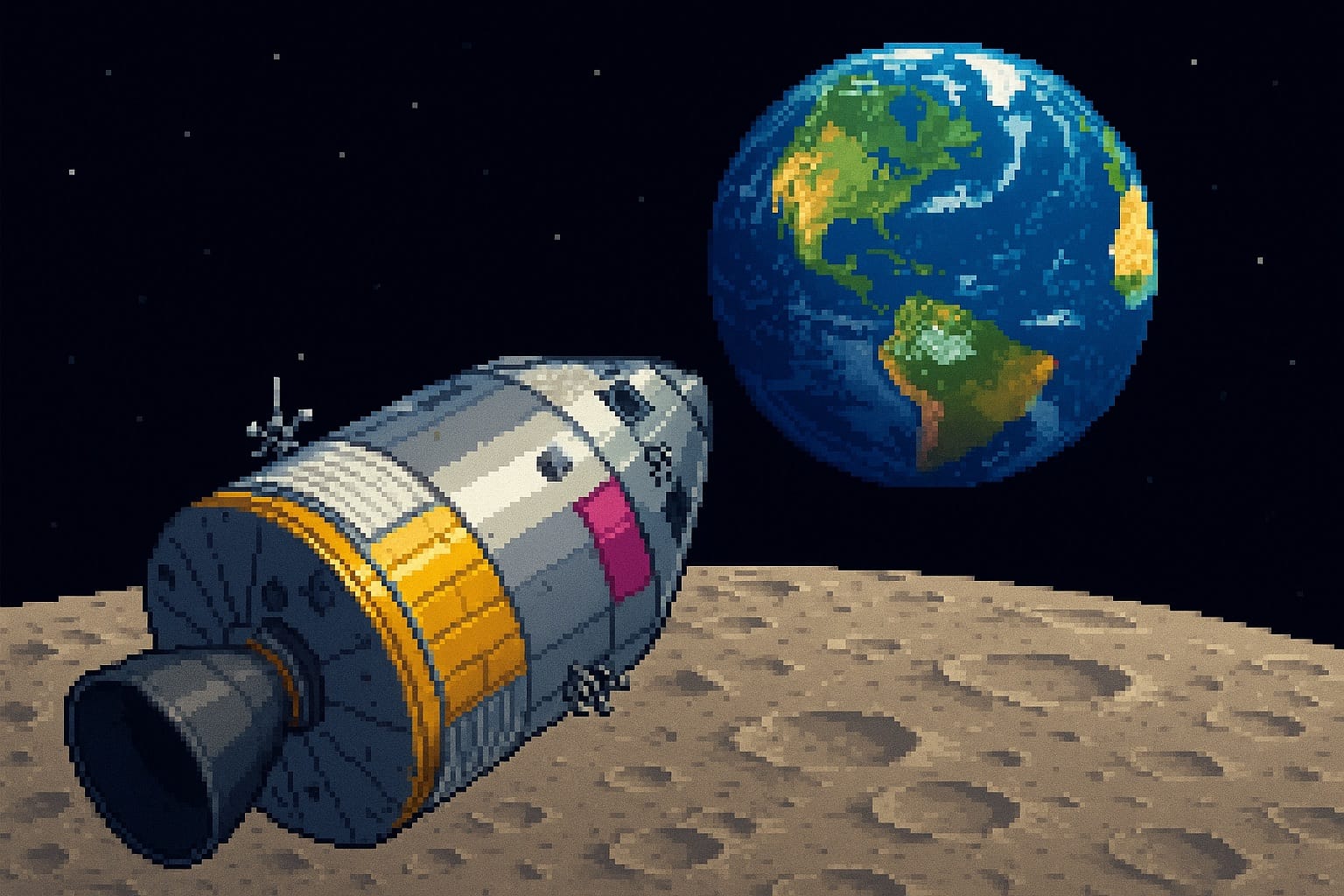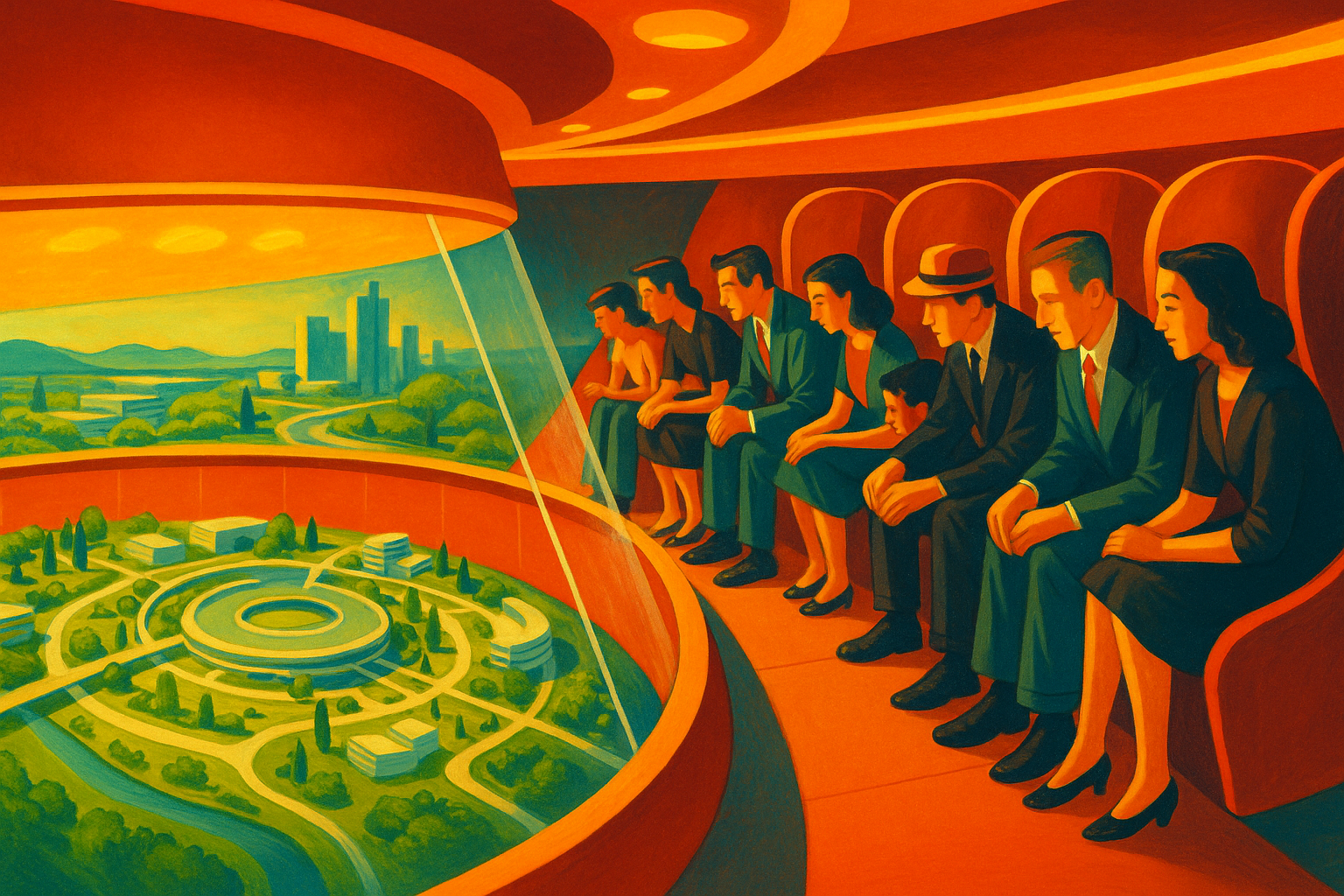The Overview Effect: An Objective Moral Context for the Circular Century

Last week in our letter about Marie Kondo, we explored the idea that “joy is the secret ingredient of the Circular Century”. This week, we make the case that the Overview Effect provides its moral premise.
- The Overview Effect: An Objective Moral Context for the Circular Century
- The Relationship Between Morality and Consumer Preference
- The Clarke Binary
- Two Dimensions of Awareness
- Conditioned for Scarcity, Evolving for Abundance
- Don’t Bring Frontier Thinking to a Stewardship Problem
- Captain Kirk and the Cold Warrior
- So What? Business Implications of Cosmic Context
- Practitioner Insights: Working with Escapist Thinking
- Metadata for Ghost CMS
The Relationship Between Morality and Consumer Preference
The things we buy have to earn our business. Nothing gets made without paying for itself. But decisions to buy are informed by the moral context of the day—and these moral contexts are brittle.
They seem completely rigid right up to the moment they shatter. Cigarette advertisements on television were normal until suddenly they weren't. Fur coats were status symbols until they became marks of cruelty. The shift happens fast, but it's not arbitrary. Changes in moral behavior are expressed as matters of taste, but they're rooted in facts: cigarettes cause cancer, and fur requires suffering.
These shifts may start as philosophical debates over the nature of The Good. But to the practical business person, they confer the power to predict human behavior over time. Which makes frameworks like the Overview Effect and biophilia valuable as ethical compasses and as strategic oracles. They reveal which direction the moral context is moving.
The Clarke Binary
Arthur C. Clarke once observed that there are two possibilities:
“either we are alone in the universe, or we are not. Both prospects are terrifying.”
If we're alone, we bear the weight of being consciousness's sole expression in the cosmos. If we're not alone, we face the question of whether we're worthy of existence among other civilizations. Clarke's Binary points to something essential: we need context for gratitude. We need to understand what we've inherited.
Two Dimensions of Awareness
I know of two ways to reach this awareness, one objective, the other subjective.
Objective: The Overview Effect
One path is what Space philosopher Frank White named “Overview Effect.” It’s what astronauts describe when seeing Earth from space and experiencing a cognitive shift. In space, you watch the planet rotate beneath you, borders invisible, atmosphere paper-thin, the whole magnificent fragile thing suspended in absolute darkness. The perspective delivers what Clarke describes: cosmic context that makes our inheritance palpable.
Subjective: Biophilia
The other path is what E.O. Wilson called biophilia, humanity's innate affinity for life and living systems. You don't need to leave Earth to experience it. It is the feeling you get when you perceive nature in a state of undistracted presence. The sense of appreciation emerges from within.
Alan Bean, the fourth person to walk on the moon, captured both perspectives comparing Earth to the lunar surface:
"I don't think we were thrown out of the Garden of Eden. Just look around. We're still in it."
Both the Overview Effect and biophilia reveal a fundamental moral truth about our context. The former, objective and privileged; the latter, subjective and available to anyone who gives it a try.
Both paths create what we might call species situational awareness—the ability to deal with the world as it is, not as we've been evolutionarily conditioned to perceive it. David Foster Wallace captured this in his commencement speech about fish who don't know they're swimming in water.
Conditioned for Scarcity, Evolving for Abundance
For hundreds of thousands of years, humans lived in conditions where scarcity was the prevailing condition, where competition for resources was survival, where nature was more powerful than us. Then came the Industrial Age, and with it a sudden, massive leap in our power over nature.
If humanity were a person, the Industrial Age would be like its adolescence: old enough to get into serious trouble but not wise enough to clean its room. We gained enormous power without the wisdom to manage it.
The Circular Century is what comes next. It's not a rejection of industrial power, but the maturation that makes us worthy of it. It's learning to tidy our room. To take responsibility. To manage our capabilities with wisdom.
Marie Kondo had this to say about the personal benefits that come from tidying that applies to this context:
"As we hone our sense of what brings us joy through the process of tidying, we come to know ourselves far better. This is the ultimate purpose of tidying up."
Don’t Bring Frontier Thinking to a Stewardship Problem
If space travel can confer perspective, it cannot shield us from folly. There are those who have drawn the wrong lesson from the Overview Effect. That misreading could delay the moral shift that we need.
In 2019, Jeff Bezos laid out his vision for humanity's future in space. He acknowledged that "Earth is the best planet"—we should keep it that way, he said. But then he presented what he saw as an unavoidable logic: human demand is infinite, Earth's resources are finite, and this imbalance leads to one solution: rationing, of energy and materials. Zero growth.
His answer: make resources infinite by moving heavy industry to space. Mine asteroids. Build manufacturing facilities in orbit. Bring the resources back to Earth but leave the pollution up there. We get the benefits without the environmental cost.
What's interesting is how closely this logic aligns with that of degrowth advocates like Greta Thunberg. Both start from the same premise: infinite demand meets finite resources. Bezos concludes we need to expand the frontier into space. Degrowth advocates conclude we need rationing. Both miss a third possibility.
Infinite Materials Not Required
They assume that humanity's demand for value and extraction of resources are permanently, inextricably linked. It's like saying that a household with an overflowing bathtub has "infinite demand for water."
You could go to the moon, dig up tons of regolith, retrieve ice, melt it, and send it to that household to satisfy its “infinite” demand. Alternatively, you could turn off the tap and enjoy your bath.
Bezos's logic suggests the former approach. And to be clear: we're not calling for no baths. The idea is to use resources sensibly. Circularity is about closing the loop so the same materials flow through the economy indefinitely, creating value without requiring constant extraction.
No Room on Earth for Space Junk
There's a second fallacy in the space-mining vision. Even if we source materials from asteroids instead of Earth's crust, what happens at end-of-life? Does a truck built from asteroid metal get tossed into a salvage yard when it's done? How much room exists in our landfills when we throw away space-sourced junk?
Whether we mine asteroids or earthly mountains, we need to plan around the full lifecycle of what we make. Moving the extraction off-planet delays but does not solve the fundamental design challenge.
This isn't to say all space enterprise is intrinsically unwise. Google's recently announced Project Suncatcher, which aims to place data centers in orbit where they absorb sunlight and emit heat harmlessly beyond our atmosphere, makes logical sense. Using space as a heatsink for computational infrastructure could be genuinely beneficial.
But continuing manifest destiny into space to make more stuff because we can't manage the stuff we already have? That's the most expensive, wasteful example of kicking the can I can imagine. It's like running away from the mess in your room by moving to a bigger house.
The Overview Effect should inspire us to become better stewards here, not more ambitious escapists. When astronauts see Earth from space and report overwhelming love and protectiveness for it, the response shouldn't be "great, now let's industrialize everywhere else." That fails to resolve the tension of Clarke’s Binary.
Captain Kirk and the Cold Warrior
William Shatner flew to space aboard Bezos's rocket in 2021. Bezos invited him as part of his vision for building infrastructure for future space entrepreneurs—a vision I've covered favorably as an example of managing long-term risk through patient capital investment.
Shatner is careful to defend his host's intentions. In his memoir Boldly Go, he writes: "Jeff Bezos, I must say, is a misunderstood person. His excursion into outer space seems, on the surface, to be the excesses of capitalism shown off in a gaudy display of ego, and yet ego is not what has driven Jeff to space. He is a deeply thoughtful man who has been shaped by his own experiences and upbringing."
But then Shatner describes his own experience of seeing Earth from space:
"[The Overview Effect] can change the way we look at the planet but also other things like countries, ethnicities, religions; it can prompt an instant reevaluation of our shared harmony and a shift in focus to all the wonderful things we have in common instead of what makes us different. It reinforced tenfold my own view on the power of our beautiful, mysterious collective human entanglement, and eventually, it returned a feeling of hope to my heart. In this insignificance we share, we have one gift that other species perhaps do not: we are aware—not only of our insignificance, but the grandeur around us that makes us insignificant. That allows us perhaps a chance to rededicate ourselves to our planet, to each other, to life and love all around us. If we seize that chance."
There's something remarkable about hearing the word "insignificance" from William Shatner. This is a man known for strident self-confidence. In this case, he doesn't use that term lightly, and does not mean it as a synonym for humility. He was struck by a palpable contrast: the smallness and colorfulness of Earth hanging alone in the endless, colorless void of space.
And he's not alone. Frank Borman commanded Apollo 8, the mission that captured the famous Earthrise photograph. He regarded himself as a Cold Warrior: "I was there [commanding the space program mission where his fellow astronaut Bill Anders snapped the Earthrise photo] because it was a battle in the Cold War. I wanted to participate in this American adventure of beating the Soviets."
But reflecting on that mission years later, Borman said:
"It will probably be remembered as much for Bill's picture as anything because it shows the fragility of our Earth, the beauty of the Earth, and just how so insignificantly small we are in the Universe. It was the beginning of the realization that we need to take care of it."
Two unlikely witnesses to the same moral truth. Borman, the Cold Warrior. Shatner, Captain Kirk himself. Both were changed by the Overview Effect. Both observed the same truth.
And Bezos—one of the most resourceful people in history—is trying to resolve that same moral need that all who experience it feel. But he's channeling it into building off-planet infrastructure when the Overview Effect itself points to a different answer.
Clarke's Binary suggests a more sensible approach: get our house in order. That way, whether we're alone in the universe or not, we have nothing to be ashamed of. Nothing to be "terrified" of, to use Clarke's word. Just a better way of living.
There is room in the Circular Century for space exploration and economic growth. What will make it distinctive is finally, thoroughly managing what we have before we expand into what we don't. It's about demonstrating we're worthy of this planet—the best one in the solar system, as Bezos himself acknowledged—before we try to industrialize everywhere else.
That's the evolution the Overview Effect should inspire. Not escape. Not expansion into the cosmos to avoid dealing with our mess. But the wisdom to close our loops, manage our resources, and build systems that honor the gift we've inherited.
The rest of this essay explores the business implications of cosmic perspective, how to work with escapist thinking in transformation projects, and why proving worthiness creates competitive advantage.

Subscribe to continue reading






